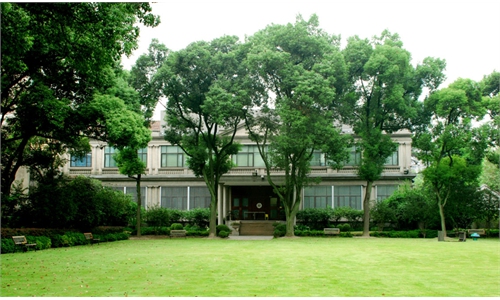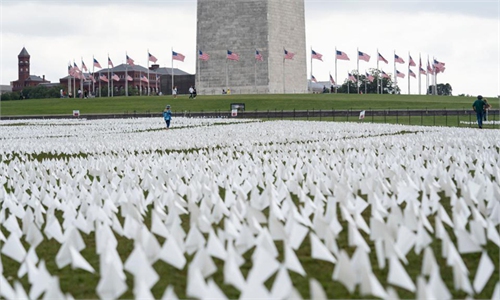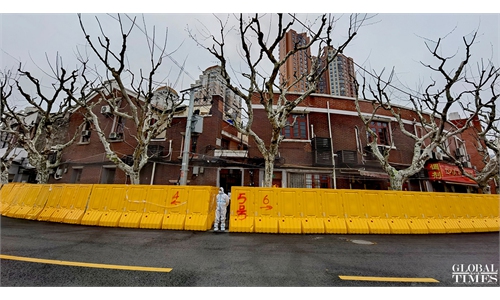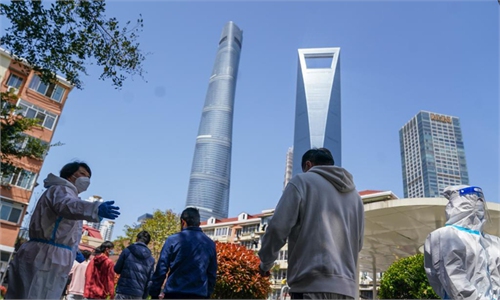Shanghai fights Omicron with persistence and solidarity, offers lesson on importance of sticking to zero-COVID path
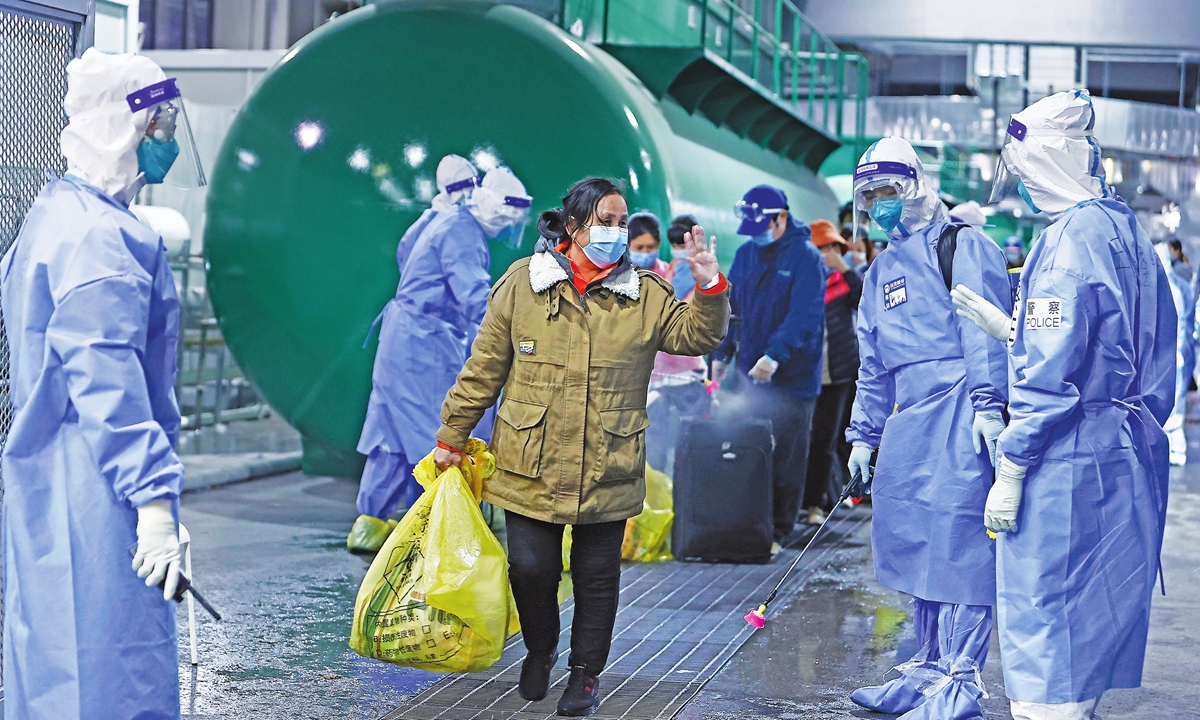
Residents end quarantine and say goodbye to the staff at the temporary hospital in the Shanghai New International Expo Center on April 14, 2022. On the day, the first group of 322 patients infected by the COVID-19 virus ended their quarantine period and left the hospital. Photo: VCG
As the city of Shanghai is going through the most difficult time in its fight against Omicron, doubt, anxiety and fatigue are noticeable among local residents and some heart-wrenching stories could easily arouse the public's mood, but more people are finding ways to cheer up, help each other and suggest solutions, as patience and persistence are more crucial to win this hard battle.
A phone call recording went viral of a desperate elderly man in Shanghai's Xuhui district asking the community committee for help as he ran out of medicine and food. In another sad story, a public health official in the city's Hongkou district reportedly died by suicide after he, like many other grassroots officials, had been relentlessly fighting the Omicron outbreak.
Those sad stories have follow-ups. Local authorities helped transfer the elderly man to a local hospital on Thursday for treatment and the local public health authority confirmed the death of the public health official, sending condolences to his family and vowing to take care of his wife who has cancer.
It's indeed the most difficult time for Shanghai as intensive public anger flooded the internet. The Global Times talked with a dozen residents in Shanghai from at least five districts on Thursday, and learned that they faced various difficulties in the past weeks such as food shortage, delayed transfer of their infected neighbors to collective quarantine places, and the chaotic handling of residents' daily requests in some neighborhoods.
However, unlike claims made by some Western media that dynamic zero-COVID strategy is facing resistance in Shanghai, those residents do not have doubts about this approach, which has been proven successful over the past two years in containing the virus and keeping the death rate caused by COVID-19 at a low level.
Experts said the current difficulties of Shanghai exposed that the city's lack of preparation for the Omicron outbreak, policy flip-flops, loopholes in community management and a "lower-guard" mentality among officials due to fatigue in fighting the epidemic. To ease public's mood, it's necessary to be transparent on controversial social issues and the epidemic handling, fix the problems such as the delayed treatment of elderly people who have underlying diseases, and mobilize all officials and Party members to help streamline the supply of daily necessities, and ease the mounting pressure on grassroots workers and volunteers.
Problems exposed by Shanghai are also the problems needed to be tackled by other parts of China when the country has to stick to its dynamic zero-COVID strategy amid Omicron, but the strategy needs to be more specific and scientific.
Shanghai's previous targeted prevention approach appears to have fallen behind in the race against the highly contagious and more concealed Omicron variant, even though it helped the financial engine weather previous flare-ups without compromising economic growth, some experts said, noting that the lessons that Shanghai offers to the rest of the country is how important it is to stick to the dynamic zero-COVID policy.
The current global epidemic is still very serious, as prevention and control work cannot be relaxed. Persistence is victory, Chinese President Xi Jinping said during an ongoing inspection tour to South China's Hainan. He also emphasized that it is necessary to adhere to the people and life first, adhere to scientific precision, dynamic approach and pay close attention to various measures for epidemic prevention and control.

A container truck drives out of a passenger ship at the Yantai port in Yantai, East China's Shandong Province, on April 13, 2022. The truck is full of supplies to aid Shanghai in its fight against the virus. Photo: VCG
Emotional stress
The city has recorded over 250,000 infections in this round of flare-up. Despite difficulties, the only way for Shanghai to return to the scientific and precise path of fighting the virus is persistence, some experts said, noting that there have been good signs that the positive cases found at the community level have been declining, which showed that measures such as strict quarantine and massive nucleic acid testing as well as antigen testing measures worked.
Identifying infected cases as early as possible and isolating as many mild and asymptomatic cases at quarantine places to lower the risk of spreading are all part of the dynamic zero-COVID strategy, to which the city has been quickly adapting to from its previous policy, bringing it new hope to "flatten the curve" of daily increases.
Local authorities have classified all the communities into "locked down," "controlled" or "precautionary" based on the screening results and situation, and has lifted lockdowns for 7,565 communities after no positive cases were reported in these areas in the past two weeks.
In "controlled" neighborhoods, people are allowed to walk inside the community, while in "precautionary" areas, one person from each household may be allowed to go out to buy daily necessities.
Facing such widespread public emotions and anger toward inappropriate handling of the outbreak, it's time to defuse public anger by fixing the issues such as the treatment of elderly people and being transparent on the current situation, mobilizing more officials to help ease the burden on grassroots workers," Zhang Yiwu, a professor at Peking University, told the Global Times.
More importantly, it's time to deliver a clear message to Shanghai residents that we are capable of containing the virus spread, injecting confidence in the public, rather than being undecided and hesitant in rolling out the anti-epidemic measures, Zhang said.
Persistence is victory
As Shanghai is scrutinized by the world, many local residents shared heart-warming stories about how neighbors help each other, and how community workers play a crucial role in ensuring daily necessities, and such solidarity among Chinese people reflects a firm foundation for winning this battle against the virus.
A 52-year-old Shanghai resident surnamed Ji expressed her gratitude to staff in her community when she talked with the Global Times on Thursday. The resident lives far away from her parents, who are living in a small residential community in Xuhui district, where most of the residents are seniors.
She told the Global Times that she took her parents to her apartment on March 20 before the community was sealed off due to COVID-19 prevention and control. "But my 76-year-old mother couldn't walk due to high psychological pressure caused by the epidemic when I took her to my apartment. I called 120 for emergency help, but I was told to wait for about five hours."
She immediately called her neighborhood committee and told them the situation. "A community doctor called us and advised us to give her the medicine she usually takes," she said, noting that her mother felt better later. The volunteers in her community also helped her mother get prescription medicine.
She is taking care of her parents alone at home as her husband - a local policeman - is on duty.
Others expressed their confidence that the outbreak can be eventually contained, as long as every positive case is identified and all the transmissions are cut off by quarantining all the carriers. And for many residents in Shanghai, persistence is the victory, which is also a common faith shared by those who voluntarily follow the anti-epidemic measures that protect as many lives as possible.
People find various ways to vent their emotions. A local resident said when he felt depressed, he invited others to sing songs on the Chinese version of TikTok. Another one who lives in a residential compound where dozens of positive cases were found said she understood that the local community committee faced a shortage of employees and volunteers, so she worked until early morning to help others purchase the food and daily necessities. "Instead of complaining, we can do small things to make some changes," she said.
The Chinese mainland has a low COVID-19 mortality rate due to early detection and quarantine measures to stem the outbreak, preventing it from creating a spike of infections that can exhaust the medical system, according to Wu Zunyou, chief epidemiologist at the China CDC.
"We believe that Shanghai will get better, it only needs more time," said a netizen in Shanghai. "It's believed that the suffering will eventually pass, and the light is at the end of the tunnel," said another netizen.

